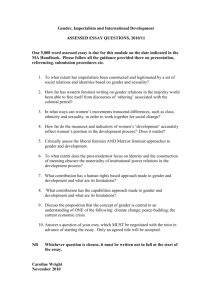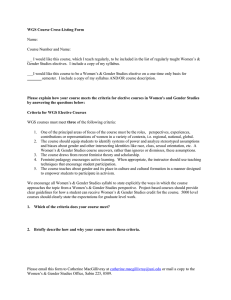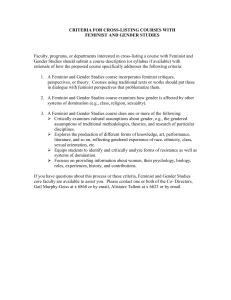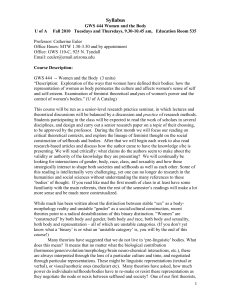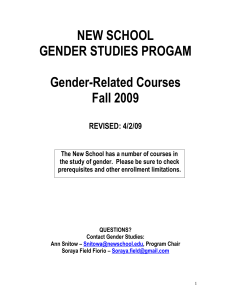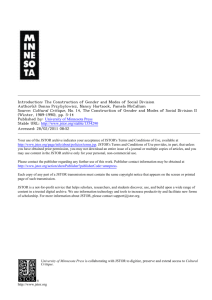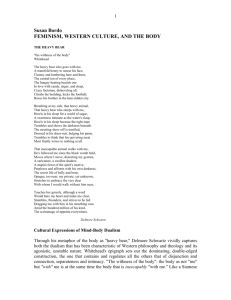Women`s and Gender Studies
advertisement
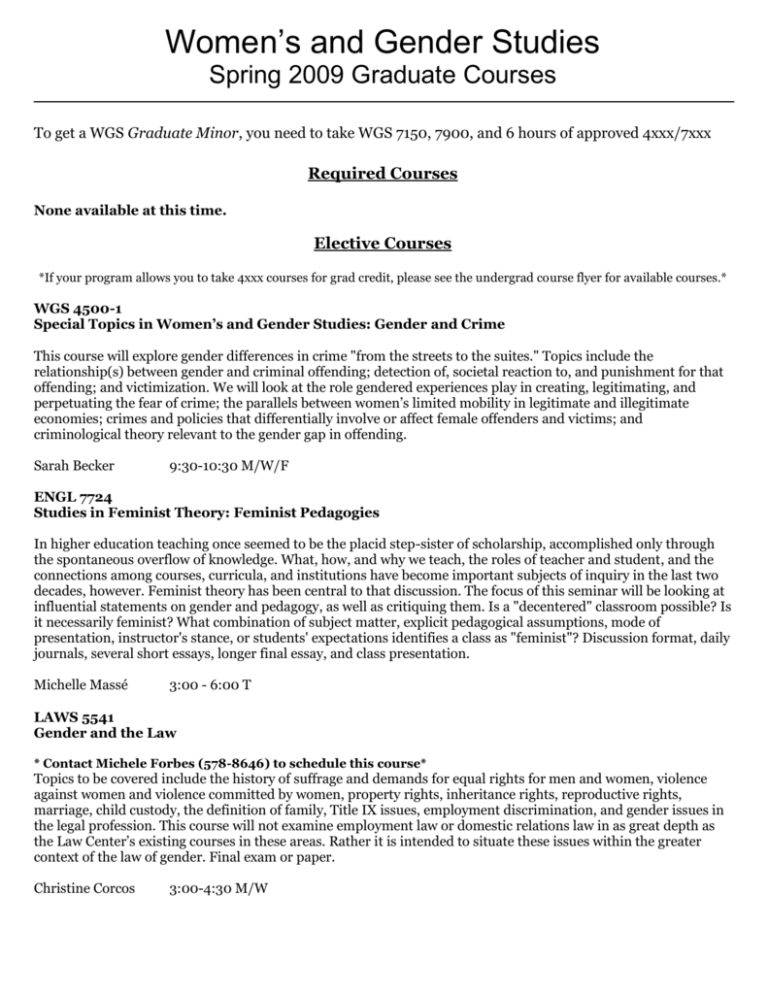
Women’s and Gender Studies Spring 2009 Graduate Courses To get a WGS Graduate Minor, you need to take WGS 7150, 7900, and 6 hours of approved 4xxx/7xxx Required Courses None available at this time. Elective Courses *If your program allows you to take 4xxx courses for grad credit, please see the undergrad course flyer for available courses.* WGS 4500-1 Special Topics in Women’s and Gender Studies: Gender and Crime This course will explore gender differences in crime "from the streets to the suites." Topics include the relationship(s) between gender and criminal offending; detection of, societal reaction to, and punishment for that offending; and victimization. We will look at the role gendered experiences play in creating, legitimating, and perpetuating the fear of crime; the parallels between women’s limited mobility in legitimate and illegitimate economies; crimes and policies that differentially involve or affect female offenders and victims; and criminological theory relevant to the gender gap in offending. Sarah Becker 9:30-10:30 M/W/F ENGL 7724 Studies in Feminist Theory: Feminist Pedagogies In higher education teaching once seemed to be the placid step-sister of scholarship, accomplished only through the spontaneous overflow of knowledge. What, how, and why we teach, the roles of teacher and student, and the connections among courses, curricula, and institutions have become important subjects of inquiry in the last two decades, however. Feminist theory has been central to that discussion. The focus of this seminar will be looking at influential statements on gender and pedagogy, as well as critiquing them. Is a "decentered" classroom possible? Is it necessarily feminist? What combination of subject matter, explicit pedagogical assumptions, mode of presentation, instructor's stance, or students' expectations identifies a class as "feminist"? Discussion format, daily journals, several short essays, longer final essay, and class presentation. Michelle Massé 3:00 - 6:00 T LAWS 5541 Gender and the Law * Contact Michele Forbes (578-8646) to schedule this course* Topics to be covered include the history of suffrage and demands for equal rights for men and women, violence against women and violence committed by women, property rights, inheritance rights, reproductive rights, marriage, child custody, the definition of family, Title IX issues, employment discrimination, and gender issues in the legal profession. This course will not examine employment law or domestic relations law in as great depth as the Law Center’s existing courses in these areas. Rather it is intended to situate these issues within the greater context of the law of gender. Final exam or paper. Christine Corcos 3:00-4:30 M/W Women’s and Gender Studies Spring 2009 Graduate Courses SW 7807-2 Social Work with Lesbian, Gay, Bisexual, and Transgender People (Prerequisite: SW 7004/7005) The purpose of this course is to enhance students’ professional competence with lesbian, gay, bisexual, and transgender (LGBT) people. Content explores social work practice at the micro, mezzo, and macro levels and across social, political, and economic realms. On the micro and mezzo levels, students will learn appropriate assessment and intervention skills for use with LGBT people. Special concerns within the population, such as the coming out process, adolescent suicide, and coping methods, will be considered. To a great extent, sexual orientation in contemporary culture is politically charged and socially regulated. To that end, students will be taught macro-level advocacy skills to fulfill their call as social workers by promoting social justice and equality. Elaine Maccio 8:30-11:30 T SOCI 7391 Feminism and Families This seminar explores the multilayered and interrelated processes affecting how families are constructed in the context of U.S. society. We will examine the experiences and perspectives of women and men and the ways that their family constructions relate to the social, economic, and political systems of their society. Throughout, we consider the macro/micro interplay of social life while treating families as a dynamic, contested social form. More specifically, we examine how culture and social structures shape the construction of families while considering the social psychological aspects of how individuals feel, think, and act in terms of specific familial arrangements and practices. By studying the interrelationship between aspects of the larger society and people's own familial constructions from a sociological perspective, this course studies the linkages between society and individuals in a fundamental sphere of social life. We will address the diverse experiences of families through a gendered lens. We will draw upon intersectional analyses of how gender, race, class, sexual orientation, age, disability, and/or other manifestations of diversity shape how women, men, and children construct and negotiate families. Selected readings and discussion will be framed using feminist theories, social constructionism, and queer theory. Dana Berkowitz 1:30-4:30 T Of Related Interest FREN 7410 Foucault and Biopower Michel Foucault well-known in gender studies circles for his work on disciplinary body practices and on sexuality, as put forth in his two books of 1975 and 1976, Discipline and Punish, and The History of Sexuality, volume 1. Recently published lectures courses from the period immediately following those books enriches his famous work by developing the notion of “biopower” and linking it to the liberalism emerging in the nineteenth century. Our course will recap Foucault’s work on discipline and sexuality and then trace notions of biopower, with constant reference to contemporary issues of reproduction, health care, and the “end of life.” John Protevi 4:30-7:30 T



